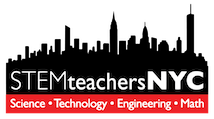3 Reasons to Fall for STEM this March
This March is jam-packed with some amazing STEM professional learning opportunities with 3 new workshops offerings! Looking for ways to reach ELL students? Concerned about Climate Change and wondering how to best teach about it? Or thinking about new ways to empower your students to become a Physicist one day? Then next month is for you. Here are three reasons to fall for STEM this March:
1. Cultivating a Passion for Physics: Everyday Actions for Developing Your Students’ Physics Identity
In this workshop, learn how to help students construct a physics identity where they see themselves as physicists and grow their confidence in understanding its value and application in a variety of STEM fields. Participants will explore a range of pedagogical approaches from small teacher actions, to how lab groups are chosen, goal setting and planning strategies, and ways to integrate research-based interventions in the classrooms. The workshop will also provide a space for teachers to reflect on their own physics and STEM identities, and examples of what educators can do to help shape and nurture these identities. To register click here.

2. ELL in STEM: Language Support Strategies for Math and Science Teachers
Come learn some excellent strategies to incorporate in your science course that will be sure to help reach and meet your ELL students’ needs. Participants of this workshop will spend some time in “ELL student-mode” as a portion of the material will be presented in a language other than English – so as to gain a better perspective of how powerful these strategies can be in communicating science content to an English language learner. To register click here.

3. The Science of Sustainability: Modeling NGSS Strategies for Teaching Climate Change
Complex problems require complex solutions and global climate change is no exception. How can students explore the complexity of climate change as well as potential solutions within the NGSS framework? In this workshop we’ll explore a range of strategies for moving beyond traditional environmental science by focusing on the interdisciplinary field of sustainability science. Through hands-on activities and discussion in both teacher and student-mode, participants will learn how to optimize the use of free materials using the Socratic method of modeling to motivate students to resolve real world issues. Teachers will also have the opportunity to try out an online tool that helps students analyze and interpret climate data. If FREE, NGSS, and MODELING peak your interest join us on March 10th. To register click here.
